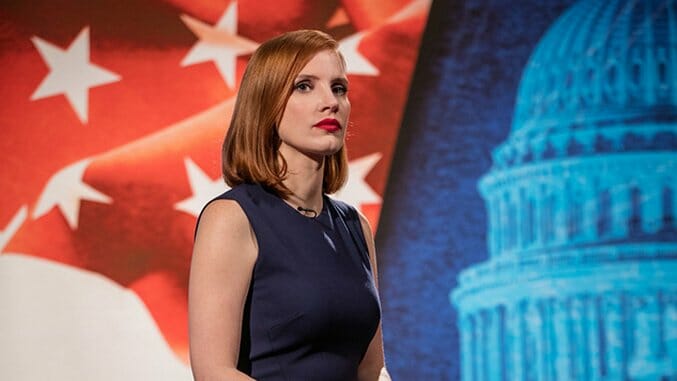
Miss Sloane plays out like a very long episode of a very boring TV drama—though its odd narrative time hops are seemingly the only aspect that differentiates its gun-control-legislation-pushing plot from anything you’d flip past on a lazy Sunday afternoon. Director John Madden (Shakespeare in Love and both Exotic Marigold Hotels, first and second-best) has made some vivid films, full of life and energy, despite their unassuming subjects. He does his best with the dry material here, but—like in the case of most dramas indulging in crosses and double-crosses—it’s the script that fails him.
Screenwriting teachers often encourage their students to read scripts by writers they respect who’ve written movies they aspire to create, which makes sense: Moviemakers watch movies, novelists read novels and screenwriters should read scripts. The downside of this training is that when a particular voice is successful in any of these mediums, capitalism and a rote approach to success lead to a deluge of copycats. In screenwriting, Aaron Sorkin is possibly the most famous voice in the business, so it’s no surprise that Miss Sloane’s fast-talking government patter sounds like a weak echo from a more established writer. This is Jonathan Perera’s very first script (not produced—it’s the first he’s ever written) and he’s proud to let you know he’s the only writer who touched the thing between his query letter regarding potential representation and greenlit production. Perera writes like he’s never done this before.
Miss Sloane’s pace often races toward that banter-y headrush familiar to those who’ve been inundated by the walk-and-talk takeover of the aforementioned Sorkin dramas, but it’s cleansed of the acid that makes Sorkin’s work clever enough to sit through. Conversations between the film’s plethora of patsies and the lobbyist demigod Sloane (Jessica Chastain) are about palm oil taxes, Senate loopholes and form filing. Topics of varying glamor are approached with the same whipcrack speed and shit-eating grin no matter their import, leaving the audience beaten down by both the meaningless political jargon and its monotonous delivery. The film tries to replicate, over and over, a tense series of searing verbal ping pong volleys, but it serves up one overripe grape after another. Lines just splat on the floor.
Without the dialogue—and Miss Sloane is basically only dialogue, a cinematic John Grisham novel (one of which, ironically enough, Sloane leafs through)—the film has to rely on its characterization and plot, both of which can barely survive without the dialogue to give them any meaning. Sloane is a robot, a hellbent D.C. gal who sweats weakness and spends so much time winning she has to enlist a hunky escort (Jake Lacy, stuffed into some tight Levi’s, with a terrible southern accent) in her endless series of hotel rooms. She’s cruel to everyone she meets in the pursuit of professional success but continues this social strategy once recruited to a smaller company dedicated to beating the gun lobby. In the clearest-eyed line of the film, her boss eventually asks her if she’s ever been normal.
It’s all a matter of winning Senate votes, which turns the film into an episode of a behind-the-scenes political circus we’ve all seen before. Sloane seems genuinely anti-gun for some reason, though she rebuts any attempt by her fellow lobbyists to bond over this small glimpse of humanity. Meanwhile, the film features solid turns by Sam Waterston, Gugu Mbatha-Raw, Ennis Esmer and Mark Strong, but their characters are clipped, breaking before the tidal power Chastain brings and inevitably buffeted without cause, as her thin character leaves nothing in her wake.
Like the powerful men of Sorkin, Sloane beats her opponents (by which I mean: conversation partners) into submission, thus signaling that each scene is over. The meter becomes so relentlessly familiar it’s hard to stay fascinated despite the verbal velocity. Then, when the scheming twists—the payoff for enduring a low-key drama like this—supposedly come, we’re not fooled for a second because Sloane has been so strictly encapsulated. A final speech reveals how we were fooled the whole film, long after we stopped caring about fictional gun legislation, palm oil and Miss Sloane’s heavily foreshadowed pill-popping. Her acting out of character isn’t surprising, it’s suspicious: She isn’t unable to use her emotions, the film just offers no evidence that she has these faculties in the first place. If Spock acts weepy in front of the Enterprise crew, we wouldn’t call that a twist—we don’t believe in his sudden psychological about-face—we just recognize it for what it is: a thinly veiled ploy. Thus, Miss Sloane is an obvious ruse whose only trump card is its failure to show us anything interesting enough for us to care.
Director: John Madden
Writer: Jonathan Perera
Starring: Jessica Chastain, Mark Strong, Gugu Mbatha-Raw, Michael Stuhlbarg, Sam Waterston
Release Date: November 25, 2016
Jacob Oller is a writer and film critic whose writing has appeared in The Guardian, Playboy, RogerEbert.com, Film School Rejects, Chicagoist and other publications. He lives in Chicago, plays Dungeons and Dragons and struggles not to kill his two cats daily. You can follow him on Twitter.